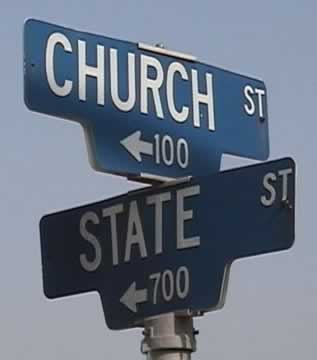I have posted once before of the case now before the Supreme Court of the United States in which a called teacher with narcolepsy was dismissed and then filed suit under the Americans with Disabilities Act provisions to keep her job. The school argued that she was a called teacher and therefore exempt from the ADA rules and she is claiming that since her duties included little explicitly religious responsibilities or teaching, the law should apply. The court will decide on the merits of that case but the past has been largely precedent siding with religious institutions and giving them fairly broad leeway to define their own rules.
So what is new? Well, the Obama administration is having second thoughts about all those governmental regulations from which religious groups have claimed exemption. President Barack Obama’s Department of Justice will ask the Supreme
Court this week to eliminate a long-standing legal precedent that
protects religious organizations from government regulations. The department “is going against what almost every court has decided …
it has has taken an outlier position,” said Richard Garnett, a law
professor at the University of Notre Dame and a senior fellow at the
Center for the Study of Law & Religion at Emory University. “It does seem to do that,” said Barry Lynn, who has run Americans
United for Separation of Church and State since 1992, after working for
the ACLU for several years. “It is quite unusual because this
administration has not been good on … church-state issues,” he told
TheDC. On Wednesday, lawyers will present their oral arguments to the
Supreme Court in “Hosanna-Tabor Evangelical Lutheran Church and School
v. Equal Employment Opportunity Commission.” You can read it all HERE. There is another story HERE. Here is another comment.

4 comments:
There’s always the chance (given some wackos on the bench) the SCOTUS will eliminate or narrow the ministerial exception in its ruling on the ADA violation. But it's probably more likely, despite the 0bama administration's brief, that the SCOTUS will leave the ADA ministerial exception in place, athough more administrative hoop-jumping documentation requirements may be required for the ministerial exception to avoid abuse by unscrupulous religious organizations.
The retention of the ministerial except is more likely because the decision (p. 9-10) of the Sixth U.S Court of Appeals clearly recognized the validity of the ADA ministerial exception:
Title I of the ADA includes an exception–known as the “ministerial exception”–which allows religious entities to give “preference in employment to individuals of a particular religion” and to “require that all applicants and employees conform to the religious tenants [sic] of such organization.” 42 U.S.C. § 12113(d).
The appeals court decision also noted (p. 9):
The retaliation provision of the ADA prohibits employers from “discriminat[ing] against any individual because such individual has opposed any act or practice made unlawful by [the ADA] or because such individual made a charge . . . under [the ADA].” 42 U.S.C. § 12203(a).
[continuing...]
And the ministerial exception was also recognized when the appeals court decision concluded (pp. 17-18):
In the instant case, Hosanna-Tabor has attempted to reframe the underlying dispute from the question of whether Hosanna-Tabor fired Perich in violation of the ADA to the question of whether Perich violated church doctrine by not engaging in internal dispute resolution. However, contrary to Hosanna-Tabor’s assertions, Perich’s claim would not require the court to analyze any church doctrine; rather a trial would focus on issues such as whether Perich was disabled within the meaning of the ADA, whether Perich opposed a practice that was unlawful under the ADA, and whether Hosanna-Tabor violated the ADA in its treatment of Perich. As Plaintiff notes, the LCMS personnel manual, which includes EEOC policy, and the Governing Manual for Lutheran Schools clearly contemplate that teachers are protected by employment discrimination and contract laws. In addition, none of the letters that Hosanna-Tabor sent to Perich throughout her termination process reference church doctrine or the LCMS dispute resolution procedures.
Furthermore, this Court would not be precluded from inquiring into whether a doctrinal basis actually motivated Hosanna-Tabor’s actions. See, e.g., Geary v.Visitation of Blessed Virgin Mary Parish Sch., 7 F.3d 324, 329 (3d Cir. 1993) (finding that the First Amendment did not preclude the court from “determin[ing] whether the religious reason stated by [the school] actually motivated the dismissal”); DeMarco, 4 F.3d at 171 (noting that a court can conduct an “inquiry . . . directed toward determining whether the articulated purpose is the actual purpose for the challenged employment related action” without “calling into question the value or truthfulness of religious doctrine”).
Because the ministerial exception does not bar Perich’s claims against Hosanna-Tabor, we VACATE the district court’s order entering summary judgment on behalf of Defendant and REMAND with instructions that the district court make a finding on themerits of Perich’s retaliation claim under the ADA.
Prediction: Supreme Court will vote
5 to 4 in favor of minsterial
exception. The State does not really
want to interfere with church rights.
As for how the SCOTUS might decide, it may be worth looking at the tea leaves contained in the transcript of the oral arguments made before the SCOTUS today, October 5, 2011, where the lawyers on both sides answer questions from the various justices.
Post a Comment